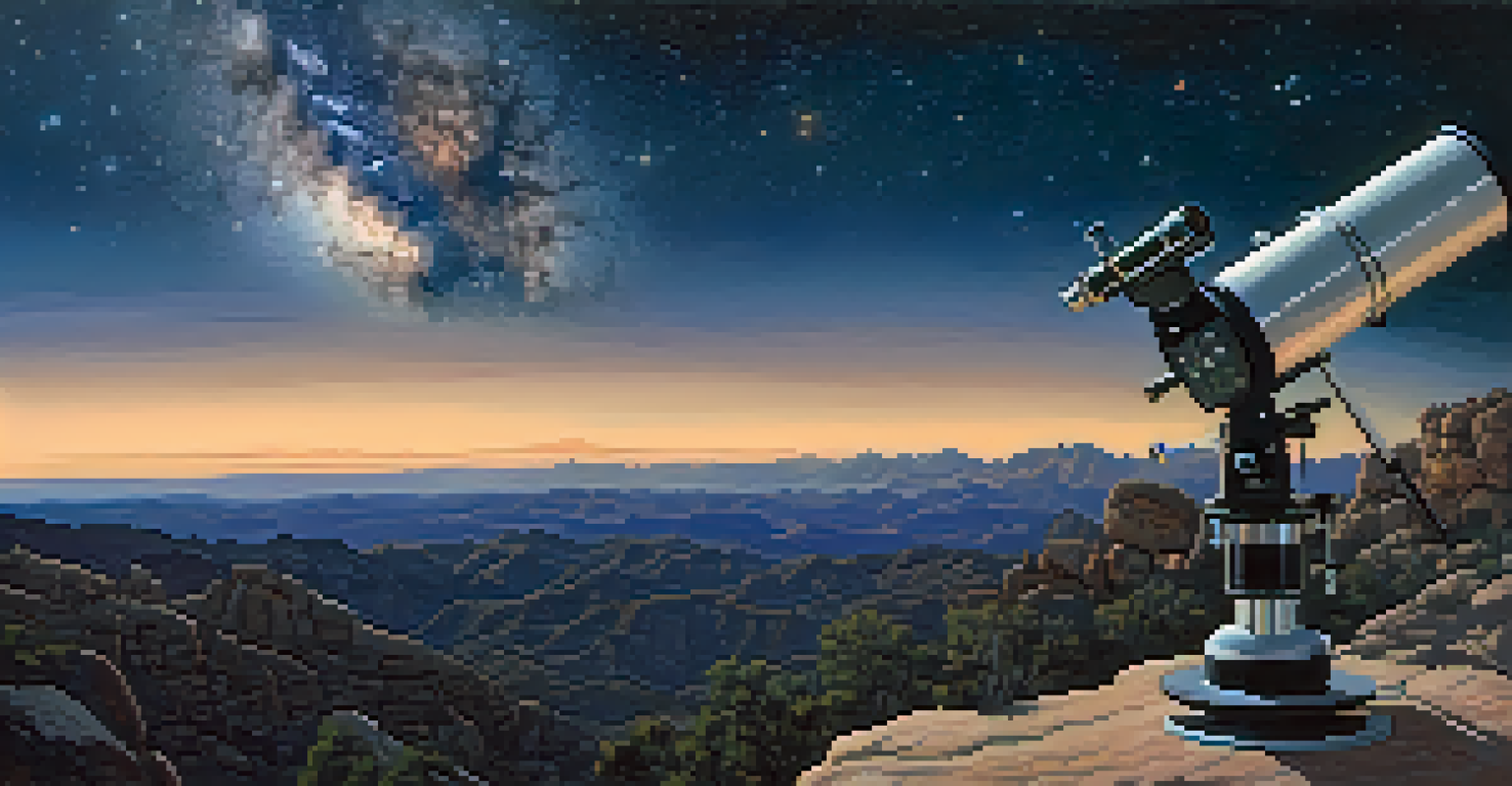How Tucson's Location Enhances Its Astronomical Views

Tucson's Clear Skies: A Stargazer's Dream
One of the biggest advantages of Tucson's location is its famously clear skies. The city's elevation and dry desert climate contribute to low humidity levels, which means fewer clouds and clearer nights. This makes Tucson an ideal spot for astronomers and casual stargazers alike, providing unobstructed views of the cosmos. With an average of 300 sunny days a year, residents often joke that the stars are just waiting to be gazed upon.
The clearest way into the Universe is through a forest wilderness.
Moreover, the lack of light pollution in many areas surrounding Tucson enhances this stargazing experience. The city has made significant efforts to maintain darker skies by promoting responsible lighting practices. This means that when night falls, the stars come alive, twinkling brightly against the backdrop of the vast desert sky. For those who appreciate the beauty of the universe, Tucson's clear skies are truly a gift.
Additionally, the city's proximity to several mountain ranges further aids in minimizing light pollution. These natural barriers not only provide breathtaking views during the day but also shield the night sky from urban glow. As a result, Tucson's residents can enjoy stunning celestial displays, making it a hotspot for astronomers, photographers, and anyone with a love for the night sky.
Altitude Advantage: Higher Elevation, Better Views
Tucson's elevation, sitting at about 2,400 feet above sea level, gives it a unique edge for astronomical observations. Higher altitudes typically offer thinner air, which can significantly reduce atmospheric distortion. This means that the stars, planets, and other celestial bodies appear sharper and clearer to the naked eye and through telescopes alike.

Moreover, the elevation allows for a more expansive view of the horizon. This is particularly beneficial for stargazers hoping to catch a glimpse of celestial events like meteor showers or eclipses. With fewer obstructions in the way, Tucson's residents enjoy a panoramic view of the heavens, making every stargazing session an unforgettable experience.
Tucson's Clear Skies Enhance Stargazing
The city's low humidity and minimal light pollution create ideal conditions for observing celestial events.
For amateur astronomers, this altitude means less interference from atmospheric conditions that can hinder visibility. As a result, many local observatories, such as the Kitt Peak National Observatory, have chosen to set up shop in the area. Their commitment to research and education highlights how Tucson's location can enhance the understanding of our universe.
The Desert Landscape: A Natural Observatory
Tucson's stunning desert landscape is not just visually appealing; it also plays a crucial role in enhancing astronomical views. The vast, open spaces surrounding the city provide ample room for star-gazing without the distractions of urban life. With minimal vegetation obstructing the view, the desert offers a clear line of sight to the stars and planets above.
To confine our attention to terrestrial matters would be to limit the human spirit.
Additionally, the unique geological formations and diverse terrain create natural viewing platforms. Whether you're hiking in the Saguaro National Park or standing atop a mountain, the elevation and lack of surrounding light make for optimal stargazing conditions. Many locals take advantage of these natural observatories, often bringing their telescopes to remote areas for an uninterrupted celestial experience.
The combination of desert beauty and astronomical clarity creates a perfect setting for events like the annual Tucson Gem and Mineral Show, where enthusiasts gather to marvel at both earthly and celestial wonders. The local community embraces this unique aspect of their environment, fostering a culture that values the connection between nature and the cosmos.
Climate Considerations: Favorable Conditions Year-Round
Tucson's climate is another factor that enhances its astronomical views. With its warm, dry desert conditions, the city experiences fewer rainy days compared to many other locations. This consistent weather pattern allows for more nights of clear skies, making it easier for residents and visitors to plan stargazing outings without the worry of sudden rain.
In addition, the seasonal variations in Tucson's climate can lead to spectacular astronomical phenomena. For instance, during the winter months, the air is often more stable, providing ideal conditions for observing celestial events like the Geminid meteor shower. The dry air also means that heat waves, which can blur star visibility, are less common.
High Elevation Offers Better Views
Tucson's elevation of about 2,400 feet reduces atmospheric distortion, allowing for clearer views of the night sky.
Moreover, Tucson's warm evenings encourage outdoor activities, including night sky observations. Local astronomy clubs frequently organize events to engage the community, fostering a love for the stars. This climate not only supports stargazing but also nurtures a vibrant culture of astronomical appreciation.
Community Engagement: Local Astronomy Events and Clubs
Tucson boasts a passionate community of astronomy enthusiasts, which enhances the stargazing experience for everyone involved. Various clubs and organizations regularly host events, allowing individuals of all ages to come together and explore the night sky. Whether it's a casual viewing party or a more structured lecture, these gatherings create an inviting atmosphere for learning and sharing knowledge.
One prime example is the Tucson Amateur Astronomy Association, which organizes star parties and educational programs. These events provide opportunities to use telescopes and learn from experienced astronomers, fostering a sense of camaraderie among participants. Newcomers are welcomed with open arms, making it easy for anyone to dive into the fascinating world of astronomy.
Furthermore, local observatories often collaborate with schools to promote science education. By bringing students to observe celestial events, they inspire the next generation of astronomers. This emphasis on community engagement highlights how Tucson's location is not just about physical advantages; it's also about fostering a love for the stars in the hearts of its residents.
Cultural Significance: Astronomy's Role in Tucson's Heritage
Astronomy has deep roots in Tucson's cultural heritage, intertwined with the history of Indigenous peoples who have long gazed at the stars. Many local tribes have rich traditions and stories related to celestial navigation and the significance of various constellations. This connection to the night sky adds a layer of depth to Tucson's stargazing culture.
As Tucson evolved, its astronomical significance continued to grow, particularly with the establishment of notable institutions like the University of Arizona's Lunar and Planetary Laboratory. This institution has played a pivotal role in space exploration, contributing to missions that explore the solar system. The blend of cultural history and scientific advancement enriches Tucson's identity as a center for astronomy.
Community Events Foster Astronomy Love
Local astronomy clubs and observatories engage the community through stargazing events, encouraging a shared passion for the cosmos.
Today, the community embraces this heritage by hosting events that celebrate both science and culture. Festivals and workshops often highlight the stories behind the stars, creating a bridge between the past and present. This cultural significance not only enhances the stargazing experience but also deepens the connection between Tucson's residents and the cosmos.
Visiting Tucson: A Stargazer's Guide
For those considering a trip to Tucson for stargazing, there are several key locations to keep in mind. One of the most popular spots is the Mount Lemmon SkyCenter, which offers public observing nights where visitors can use high-powered telescopes to explore the night sky. The breathtaking views from this elevation make it a must-visit for any astronomy enthusiast.
Another great location is the Arizona-Sonora Desert Museum, which often hosts astronomy-themed events. With its focus on the desert ecosystem, visitors can learn about how the natural environment influences the night sky. This unique combination of education and observation makes it an engaging experience for all ages.

Lastly, don't forget to check out local astronomy clubs and their event schedules. Many offer guided stargazing sessions that are perfect for beginners. Whether you’re a seasoned astronomer or just curious about the night sky, Tucson offers a welcoming atmosphere for stargazers of every level.